The discovery of seven Earth-sized planets around the star TRAPPIST-1 unveiled by NASA on Wednesday begs a new question. Who will name the new planets?
NASA will leave the naming of the TRAPPIST-1 planets up to the International Astronomical Union, an international coalition of over 10,000 professional astronomers from over 96 countries that is headquartered in Paris.
NASA spokesperson Felicia Chou told the Daily Dot in an email on Wednesday that IAU has a formal process for naming the planets and has often taken public input in consideration.
But getting public feedback is likely to take time. IAU in 2013 took an unprecedented step of creating a process for the public to vote on the names of new planets and stars. Astronomical and non-profit organizations were invited to register and suggest names for 305 exoplanets. Voting is then opened up to the general public online. More than 500,000 voters across 182 countries voted in one NametheExoWorlds contest.
IAU just last week announced the names of 19 new “ExoWorlds” (which includes 14 stars and the 31 exoplanets surrounding them) which were decided by the winners of the 2015 NameExoWorlds contest.
IAU spokesman Lars Lindberg Christensen told the Daily Dot in an email on Thursday that while a new IAU exoplanet naming campaign is possible, none is planned for the time-being. The next steps for naming the Trappist-1 planets are not yet decided.
The internet was quick to suggest names for the new planets:
#asknasa can we call one of them “planet mcplanet face”?
— …And The Hangnails (@AndTheHangnails) February 22, 2017
#askNASA CAN YOU PLEASE CALL THE STAR “ANA” SO THAT WE CAN CALL THE SYSTEM “ANA Y LOS SIETE”????????????????
— H. (@elektrogeisto) February 22, 2017
Suggested names:
b = Planet C
c = Planet F
d = Planet E
e = Planet H
f = Planet G
g = Planet B
h = Planet Dhttps://t.co/3m45ysQoUj pic.twitter.com/wXfvNiLZMT— Ed Yong is not here (@edyong209) February 22, 2017
Some names for these guys:
– Bozo
– Chungie
– Dengl
– Earth2 Electric Boogaloo
– F•R•I•E•N•D•S
– Gregory
– Horse: The Planet https://t.co/XqxBMT3ze1— it’s kiko! (@royalpizzaboy) February 22, 2017
https://twitter.com/TheCatCampbell/status/834527648793649159
#asknasa Earth-size planet names:
Jermaine
Tito
Marlon
Jackie
Michael
LaToya
Janet— Tom Harrington (@cbctom) February 22, 2017
Such thorough vetting through the IAU has prevented the internet from demanding the intergalactic equivalent of “Boaty McBoatface.”
Quirkier names have floated to the surface, however. One star and its four exoplanets are named after the author and characters of Don Quixote, including Quixote’s horse, Sancho, thanks to the efforts of Spain’s Planetarium of Pamplona. Another exoworld straight out of a horror film was named by the Planetarium Südtirol Alto Adige in Italy, and includes an explanet named Poltergeist, one named “Lich” (a word for fictional, zombie-like undead creatures popular in European fantasy-role playing games), “Draugr” (which refers to undead creatures in Norse mythology), and Phobetor (the Greek god of nightmares).


